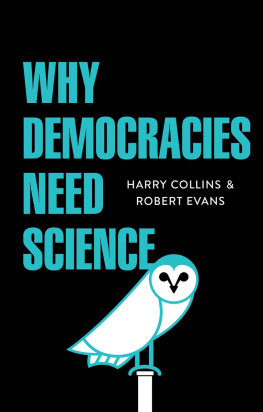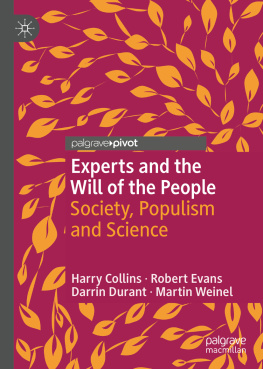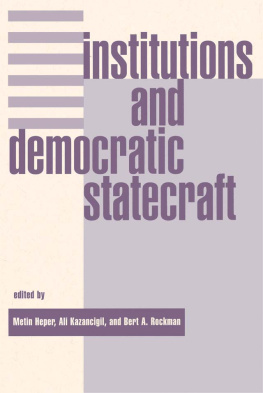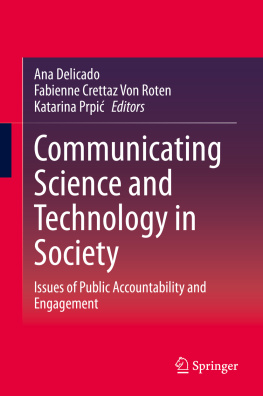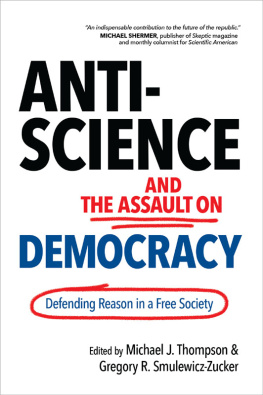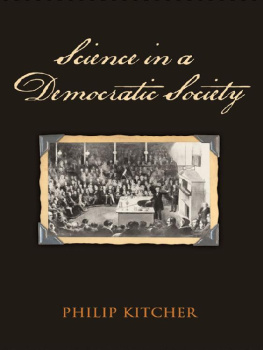Contents
Guide
Pages

Why Democracies Need Science
Harry Collins and Robert Evans
polity
Copyright Harry Collins and Robert Evans 2017
The right of Harry Collins and Robert Evans to be identified as Authors of this Work has been asserted in accordance with the UK Copyright, Designs and Patents Act 1988.
First published in 2017 by Polity Press
Polity Press
65 Bridge Street
Cambridge CB2 1UR, UK
Polity Press
350 Main Street
Malden, MA 02148, USA
All rights reserved. Except for the quotation of short passages for the purpose of criticism and review, no part of this publication may be reproduced, stored in a retrieval system, or transmitted, in any form or by any means, electronic, mechanical, photocopying, recording or otherwise, without the prior permission of the publisher.
ISBN-13: 978-1-5095-0964-5
A catalogue record for this book is available from the British Library.
Library of Congress Cataloging-in-Publication Data
Names: Collins, H. M. (Harry M.), 1943- author. | Evans, Robert.
Title: Why democracies need science / Harry Collins, Robert Evans. Description: Cambridge, UK ; Malden, MA : Polity Press, [2017] | Includes bibliographical references.
Identifiers: LCCN 2016038437 (print) | LCCN 2016055612 (ebook) | ISBN 9781509509607 | ISBN 9781509509614 (pb) | ISBN 9781509509645 (Epub)
Subjects: LCSH: Democracy and science. | Science--Political aspects. | Science and state.
Classification: LCC JC423 .C6478 2017 (print) | LCC JC423 (ebook) | DDC 338.9/26--dc23
LC record available at https://lccn.loc.gov/2016038437
The publisher has used its best endeavours to ensure that the URLs for external websites referred to in this book are correct and active at the time of going to press. However, the publisher has no responsibility for the websites and can make no guarantee that a site will remain live or that the content is or will remain appropriate.
Every effort has been made to trace all copyright holders, but if any have been inadvertently overlooked the publisher will be pleased to include any necessary credits in any subsequent reprint or edition.
For further information on Polity, visit our website: politybooks.com
Preface
There are four parts to our argument. Part I introduces the problem, setting out the main issues as we see them, and describes the academic foundations on which our call to arms is built. Part II contains most of the new ideas: it sets out the principles that inform what we call elective modernism and explains their implications for the ways in which scientific advice should be sought and used in policy-making. We argue that science should be seen as a moral enterprise and that the values that inform scientific work should be celebrated; this, as far as we know, is a new idea, so it takes precedence over the utilitarian justification of science in the argument of the book, but it can also be used in addition to the utilitarian argument when that works. Crucially, however, the moral argument works for sciences that do not have any obvious utility and, in that sense, it is prior. We argue at the same time for the primacy of democratic institutions in technological decision-making and invent a new kind of institution The Owls whose job is to represent faithfully the content and degree of certainty of any technical advice that might be thought to bear on these decisions. Part III shows that we do what we say should be done in Part II. There we suggest that one of the values that characterizes science is continuity, by which we mean that even the most revolutionary of scientific ideas will seek to incorporate and retain a good portion of what was previously accepted as true. In Part III, we show the ways in which our ideas, which we have come to realize in the light of reactions to them must include an unintended element of revolutionary thinking, relate to the huge existing literature that deals with science and democracy. In Part IV, we sum up our argument in a manifesto for the future of science that sets out the key choices facing you, the reader, in as straightforward and uncompromising a manner as possible. Given what has been said so far, it will be no surprise that this manifesto emphasizes the moral responsibility of scientists to act in ways that preserve sciences traditions and values. If scientists fail in this task and we fail to support them in it, then a crucial element of the culture that sustains democratic societies will be lost.
Though both authors take full responsibility for the whole of this book, Collins was the lead author of Part II while Evans took the lead on Part III. The authors have to thank many people. We thank Martin Weinel for his marvellous analysis of the Thabo Mbeki, anti-retroviral drugs affair and for his contributions to the more political parts of this book. Under slightly changed circumstances, he would have been a co-author. Above all, we thank the various audiences who have been willing to listen to talk of elective modernism. The term had been batted around a bit but the ideas were probably first presented by Collins on 8 October 2008 at the regular meeting of Cardiffs Centre for the Study of Knowledge Expertise and Science, and since then they have been presented at many national and international meetings and mentioned, en passant, in a few pieces of published work. Intervening events have slowed their presentation in extended form much more than we anticipated.
Part I
Introduction
1
Science as a Moral Choice
What kind of society do we want to live in? There is plenty wrong with Western societies: huge and growing inequalities; unstable and corrupt financial systems; political systems whose logic places national self-regard above the terrible suffering of distant nations; and politicians for purchase. Worse, in Western societies we are no longer confident about our basic values. The realization that a sense of moral superiority was often a thin disguise for the exploitation of colonized peoples, and now the fear that exploitation of the Earths natural resources is risking our collective future, are causing us to question what we have traditionally thought of as progress. Maybe the exploited peoples had it right and a calm life in tune with nature, however short, and however bereft of technological goods, is better than the endless quest for more, for further, for faster.
This book deals with questions one level down from these concerns, taking it that the difference in quality between our lives and those of our distant ancestors does represent progress. There has been material progress, such as freedom from high rates of maternal and infant mortality and relief from the struggle to eat and stay warm, and, to a less marked extent, there has been moral progress, with the weak no longer living in continual fear of the strong. The problem that we address here is the potential or actual erosion of our style of life which is coextensive with the erosion of certain once-cherished values. We address one part of this problem: the role of science in society.
In earlier works discussed later under the heading Three Waves of Science Studies we argued that, in spite of the huge enrichment of our critical understanding of the nature of science that has taken place since the 1970s, it is still important and intellectually possible to value expertise. Big arguments can be based on shallow foundations and we base our ideas about expertise on the commonsense view that it is better to give more weight to the opinions of those who, literally,

